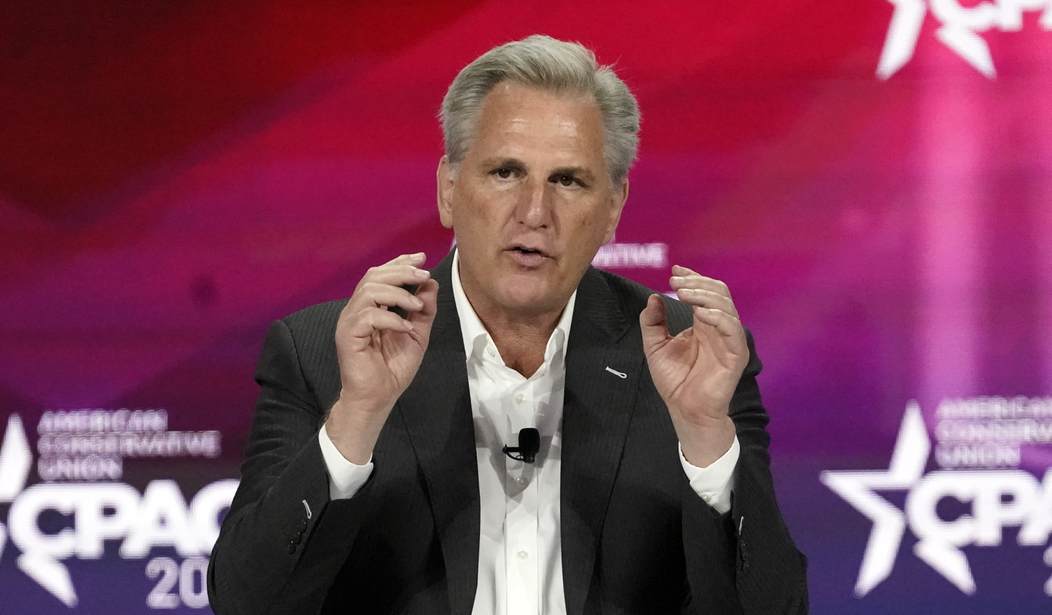Speaker-of-the-House-in-waiting, Rep. Kevin McCarthy (R-Calif.), is going to have a full agenda when he takes the gavel in January of 2023. He will have to decide which of several impeachment strategies to push, he’ll have to figure out a strategy to raise the debt limit without starting a war with his right flank, and he’ll have to try to minimize the damage that Biden and the Democrat’s irresponsible spending have done to the economy.
A tall order, that. But where Joe Biden is going to be able to see very quickly that there’s a new sheriff in town will be in Biden’s first request to authorize aid for Ukraine.
With more than $60 billion in military and humanitarian aid to Ukraine authorized since January 2021, it’s been pretty much an open checkbook for Biden when it comes to funding U.S. support for the Ukrainian government. But McCarthy says that will change if Republicans take control of the House.
“I think people are gonna be sitting in a recession and they’re not going to write a blank check to Ukraine,” he recently told Punchbowl News. “They just won’t do it.”
Instead, McCarthy thinks a Republican Congress should concentrate more on domestic issues.
“There’s the things [the Biden administration] is not doing domestically,” he said. “Not doing the border, and people begin to weigh that. Ukraine is important, but at the same time, it can’t be the only thing they do, and it can’t be a blank check.”
The United States has authorized upward of $60 billion in aid to Ukraine, with more than $18.2 billion in security assistance given since January 2021. The Senate voted to finalize more than $40 billion in new military and humanitarian assistance in May, with Republicans being the only lawmakers voting against that package — the largest investment in Ukraine thus far.
Eleven Republican senators and 57 House GOP members opposed the legislation, arguing that more needs to be done to account for how the money is spent and to trace weapons and equipment sent to the battlefield.
One of Biden’s major problems in funding the war is that the U.S. commitment is open-ended, and Biden may have stuck us with another generational war. Even a whisper of looking for a negotiated peace brings down the wrath of Ukraine’s government and Democrats.
We can understand Ukraine not wanting to give up, although its obstinancy may yet kill us all. But with nuclear conflict in the equation, making peace becomes paramount.
The survival of the Zelenskyy government is not a vital U.S. interest. It’s vital to Biden’s re-election chances, but beyond that, there is absolutely no strategic necessity for an independent Ukrainian government to survive the war.
Republican Senate candidates are making it clear that, if they’re elected, Ukraine funding will get a lot more scrutiny.
In New Hampshire, Republican Senate candidate Don Bolduc said last week that more spending is not the answer to improving conditions in Ukraine.
“We must hold the administration accountable,” he told New Hampshire’s ABC affiliate. “We just can’t print this money. It’s money we don’t have, and it’s equipment that’s being thrown at a problem without any strategy, without any policy, and it’s not going to get the job done.”
The “emergency” is over. The Ukrainian military has fought bravely and shown great skill in turning the tide of war. But Russia has the resources to fight the war for years to come while Ukraine is dependent on the U.S. to maintain its army in the field. Sooner or later, the United States is going to have to reduce its commitment to the Ukraine government.
Shouldn’t we use that simple fact to begin to push Ukraine toward peace talks? It’s not “treason” or being “pro-Russian.” It’s common sense when discussing possible nuclear war.
And if it is treason, I hope there are a few “traitors” in the room when discussing nuclear war.










Join the conversation as a VIP Member